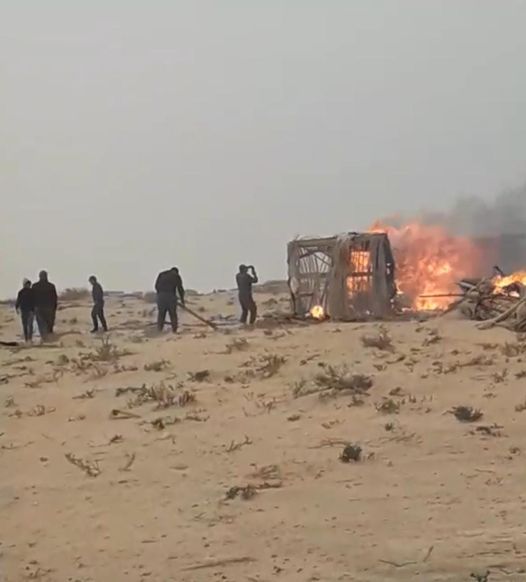Along the 190 kilometers of coastline in Western Sahara, between El Aaiun and Boujdour, are scattered huts built by Sahrawi families. Made of wood and corrugated iron, and no larger than 16 square meters to withstand the strong winds, they symbolize the traditional nomadic lifestyle of the Sahrawi people. These huts are the target of the Moroccan occupation authorities, who have launched a large-scale demolition campaign. 140 Sahrawi homes have been burned or destroyed by bulldozers, 30 in the Agtaï Baba Ali area, 80 in Boulm’airdat, and 30 in Mayara. The inhabitants received no prior warning from the gendarmerie or the auxiliary forces that carried out the operations, and they were not offered alternative housing. On the same coast, similar huts of Moroccan settlers, whether they are sailors or fishermen, in isolated or grouped dwellings, have been spared. Among the Sahrawis, the home of an old man named Baba Ould Mohamed Ould Belkheir, in the Agtaï Baba Ali region, was burned and then razed on February 17. According to his family, Mr. Belkheir has never left his home since his birth during the Spanish colonial period. He lived there with his wife and four children and supported his family by selling his fish. The pretext given by the Moroccan authorities for the destruction of the 16 m2 house inhabited by 6 people is the fight against illegal immigration and drug dens. Mohamed El Ghraid, one of the Sahrawis whose house was destroyed by the Moroccan authorities, testifies that former leaders and many Sahrawi families had been living in these huts for decades. They had chosen to move away from the noise and pollution of the cities but also from the repression of the Moroccan authorities, and lived from fishing. Other inhabitants of these houses lived from livestock and herding. Some even owned herds of camels.On these ancestral lands, the huts had replaced the traditional tents, banned by the occupation authorities after the large Sahrawi demonstration in Gdeim Izik. To date, there has been no reaction from the UN or MINURSO, its mission for a referendum in Western Sahara, to the ban on tents, the destruction of huts and the expulsion of Sahrawi inhabitants. Similarly, Équipe Média is not aware of any UN reaction to the existence of the many villages built to accommodate thousands of Moroccan fishermen, all along the Sahrawi coast, from the village of Oum Grayou in the north to El-Argoub, El-Birda, Intirfet and Bir Anzarane in the south, villages equipped with water and electricity by the Moroccan authorities. Équipe Média 28-02-2024 El Aaiun – Occupied Western Sahara
Moroccan Authorities Demolish Sahrawi Homes in Occupied Western Sahara
-
By Autor01

- Categories: Uncategorized
Related Content
The Sahrawi Struggle: Resilience in the Face of Occupation - Awareness Meeting Held in Leipzig, Germany
By
Autor01
April 11, 2024
Intisar El Qoulaib Reiterates unwavering Support for the Saharawi People on 48th Anniversary of SADR
By
Autor01
March 1, 2024
Saharawi activist from El-Aaiun recounts oppression by Moroccan forces
By
Autor01
February 28, 2024
Video: Sahrawi Women Lead Peaceful Demonstration in Occupied El Aaiun to Celebrate SADR Anniversary
By
Autor01
February 25, 2024
Carmelo Ramírez Marrero Denounces Pedro Sánchez's Support for Moroccan Occupation of Western Sahara
By
Autor01
February 24, 2024